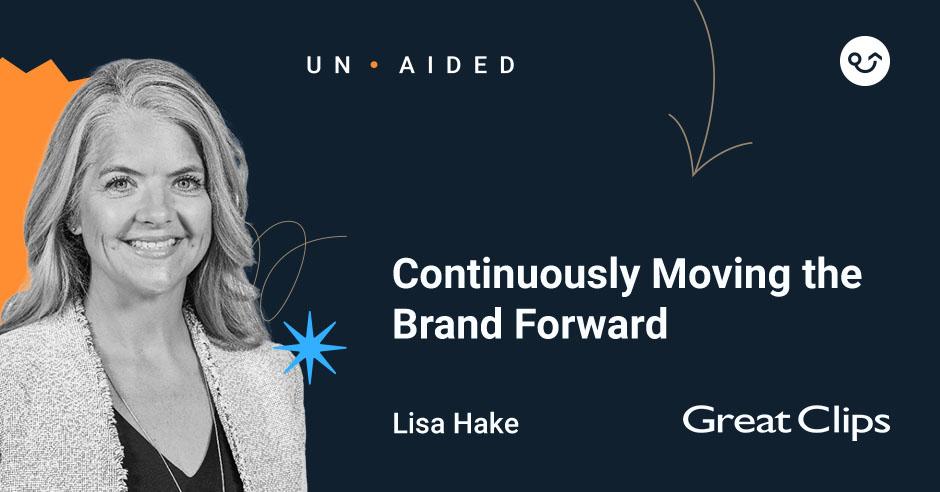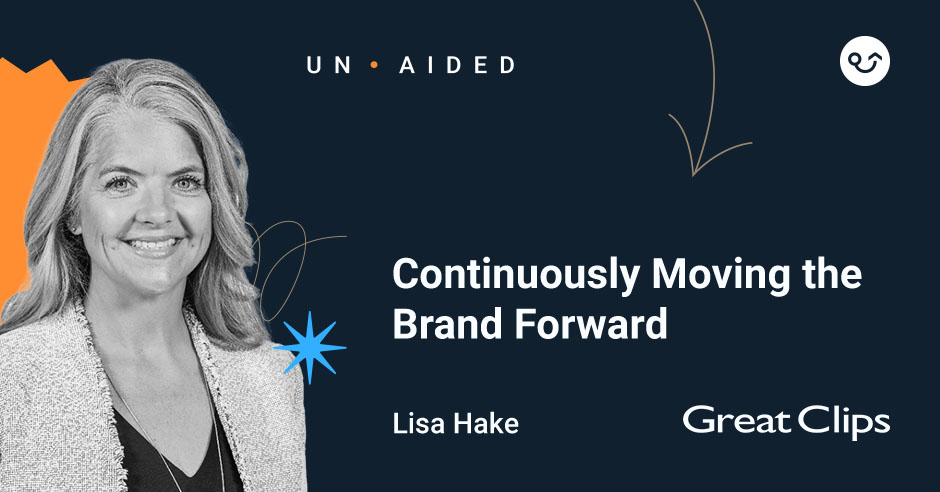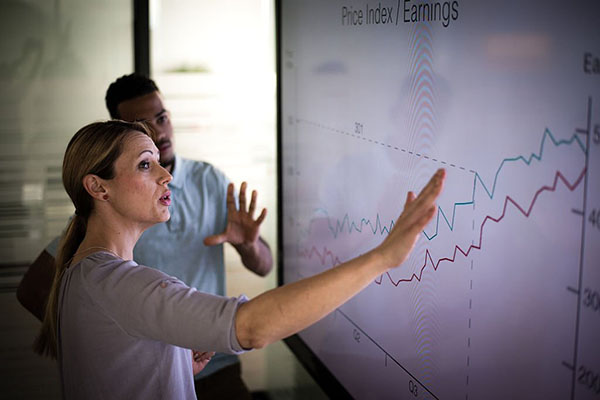
Entrepreneurship In Marketing Leadership And Continuously Moving The Brand Forward With Lisa Hake Of Great Clips
Posted in:

How do you move your brand forward? And how do you continue to move your brand forward?
In this episode, Lisa Hake the Vice President of Marketing and Communications at Great Clips joins Evan Brandoff to discuss entrepreneurship in marketing leadership. They dive into system-wide opportunities to support brand growth and her own career journey as an entrepreneur.
—
Watch the episode here
Listen to the podcast here
Entrepreneurship In Marketing Leadership And Continuously Moving The Brand Forward With Lisa Hake Of Great Clips
In this episode, we welcome Lisa Hake onto the show. Lisa has a role as the Vice President of Marketing and Communications for Great Clips. Lisa helps franchisees drive revenue and customer counts through marketing and communications. Let’s get into it.
—
Lisa, welcome to the show.
Hi, Evan. Thanks for having me.
I hear it’s snowing in Minneapolis.
It’s our first real snowstorm. Probably the first of many.
I’m sure you’re well-accustomed to snow storms, but the first one of the season is always a shock to the system.
Exactly, especially when you have a sixteen-year-old son who drove himself to school.
I’m hoping not too much snow. We were doing this episode on November 29th, so it is a bit early for a snowstorm.
Not in Minneapolis. This is actually a little late. Usually, it happens before Thanksgiving and messes up the entire holiday, so we’re okay.
I’m excited to dig into your incredible career and leading marketing at Great Clips. First, I’d love to go back in time. Where are you from originally, Lisa?
I grew up in a small town in Wisconsin, just on the border of Minneapolis, in the Minneapolis DMA. I grew up with all the Minnesota sports, with the news from the Twin Cities. When I was fifteen, my family moved to Lincoln, Nebraska. My stepfather was in collegiate athletics, so we moved to Nebraska as he worked with the athletics department there. I got plucked to the middle of the heartland when I was fifteen. I ended up going to high school there and staying there for my undergrad, then moved back here.
Where do your sports team allegiances lie?
It lies with Nebraska just because when I was in college, they were pretty good at the time. I grew up watching the Huskers as my stepfather worked for the athletic department. I was very ingrained in it there. I’m a fan. I married a lifelong Husker fan, and I got swooped into it as well through the last many years. My oldest son goes to the University of Wisconsin. When we’re there, we will cheer for the Badgers unless they’re playing the Huskers. They both are having a tough year.
How do you feel about your new coach?
Pretty good. I think Wisconsin got the better coach. We’ll see.
I think both are quality and will be good recruiters.
Yes, hopeful for the future.
You went to school in Nebraska. When did you realize that you potentially wanted to go into the market?
When I was in high school, I was introduced to DECA. Have you heard of DECA? It’s a marketing course, and I had a great teacher who got me very much into it and helped me understand the potential and future opportunities that existed in the world of marketing. I ended up going to get my undergrad in International Business.

Moving the Brand Forward: A great teacher helped me understand the potential and future opportunities that existed in the world of marketing.
I knew I wanted to study other cultures and travel and experience the world. I studied International Business with an emphasis on Marketing. I studied Japanese. That was way back when Japanese was the powerhouse of brands and businesses. I knew that there was an opportunity there until I graduated and the bubble burst in Japan, and I had to find new roads of opportunities, but I had great experiences.
I worked for Pillsbury in their international department and had a great experience introduction to marketing and helping the subsidiaries as we would launch new products in other countries and get into understanding the nuances of the culture and how we had to approach the packaging and the marketing and the communication in those other countries. It evolved all through college with that emphasis on the international focus.
Was traveling internationally part of the gig at Pillsbury?
It was, yes. Early on, traveling internationally, going and visiting the different subsidiaries. There are lots of great opportunities. Pillsbury had Häagen-Dazs’ ice cream, and there was a plant in France. They had Old El Paso with plants outside of Amsterdam. Probably the most unique experience I had there is we imported Baileys for Häagen-Dazs ice cream.
It was the number two selling ice cream that Häagen-Dazs sold. The only place you can get Baileys is Dublin, Ireland. We were having some tariff issues importing Baileys, so I had the opportunity to go there and try to figure out how we might change how we imported Baileys to help offset the costs of the products. Ultimately, they stopped making Baileys ice cream, which is very disappointing.
That is very disappointing. How can we bring it back?
We can make it ourselves.
Let’s do it. Something that I admire so much about you is you were working at Pillsbury, and then you had an amazing job at 3M. Correct me if my timeline is off. After 3M, is that when you started a company with your husband?
Yes. After I went back to school and got my MBA, I got my MBA while I was at Pillsbury, then had the opportunity to move over to 3M and work in their strategic business development group on a variety of. I played more of an internal consulting role at 3M, so I got to work with a variety of divisions and help them with different marketing strategy problems and initiatives.
It was a great opportunity. I then moved into the dental division of 3M and mainly did that because of the international edge I could take there because they had acquired a company in Germany. I was helping with that whole integration and marketing and how we were going to position the products globally. I had two young kids at the time, and the travel was a lot.
When you went international, you didn’t go for a couple of days. It was a good week at a time. It was looking at future opportunities and growth for me at 3M, being a working mom with young kids wanting to continue to grow in my career. I realized it wasn’t feasible because of the amount of commitment you had to make, especially at that time. This was the mid-2000s. There’s a lot more balance that people have now, but back then, it was you who dedicated your life to that company.
Looking at other opportunities, my husband and I always wanted to start our own business. We had talked about it constantly and decided to take the leap. He left his job first, and I kept the stable job and tried to balance both, and then eventually, we grew. It was a retail food-based business. We had a gourmet retail store where we sold gifts, gadgets, and gourmet food items. We had prepared meals that we would sell. Before the whole home chef and blue apron days, that was our version of it.
People would come to us, they could prepare their own meals, or we sold them pre-made as well. It was a great solution for us as working parents. We knew it would be a great market for it in the neighborhoods we lived in, so we grew that. We had seven locations of our own then we started franchising it.
As it took off, after probably a year and a half in is when I left my corporate life to go full-in. The name of the business was Sociale Gourmet, and we grew that. I can go into the whole story later about how and why we exited, but it was 2008 when the recession was having some issues. That led me to Best Buy. The reason I went to Best Buy is because I appreciated the experience that I had at 3M.
All of the stability and the corporate resources and the ability to think strategically, I missed that about owning your own business when you’re in the weeds and doing all the day-to-day stuff, but I love the entrepreneurial aspect of it and the chaos of it all. I wanted that, and someone had recommended Best Buy as the perfect mix of having that entrepreneurial edge in an ever-evolving retail environment and made the leap and went to Best Buy.
That’s amazing. While we’re still on the topic of Sociale Gourmet, which is a great name, and I love it, it sounds like a big impetus was work was time intensive. There was a lot of travel, so you started this company. Was it less time intensive going from 3M to starting this company?
No, I would say it was not less time intensive, but it was different because it was yours. We were so passionate about it. We wanted to build it. We had so much energy and built a team that was just as engaged as we were and excited about the future and the potential. It was different. It was eager, driven, and motivated. We made it part of our family. Our kids came along. Sometimes I’d have to work at the store and put them in the back office and get them set up with a video, or they’d crawl around and help me redecorate the retail merchandise. It became part of our life. In fact, we had to force ourselves not to talk about it sometime and not work sometimes.
To that point, that was my next question. At night in the evening, how did you turn off and go back to being husband and wife and family versus cofounders?
We did have to be forceful about it. Luckily, we had very young kids, and so they forced us. We needed to dedicate our time to them and focus on them. They started having activities. We had to be on purpose about it. We knew our roles and had clearly defined roles at that time. Luckily, my husband played more of the finance and operations side of it.
I was able to do more of the marketing and human resource side of it. That helped as well. We could say, “We’re done for the day and let’s focus on us.” It was great. One time, we had an article in Forbes, and they wrote about the entrepreneurial love story. They launched it on Valentine’s Day, this article. We laughed about it, but it was true because we did enjoy working together, and it worked well.
When we started our company, I started it with my best friend. I feel like there’s this connotation or people think it’s not good to start a business with loved ones. I don’t understand that. You understand each other so well, and it’s someone that you trust so much. I admire that you did that. What was more difficult, running a company, entering the 2008 financial recession or running marketing for a company focused on haircuts going into COVID?
That’s a good one. While I feel personally invested in the brand at Great Clips, with Sociale, we were personally invested. We had everything on the line. We had franchisees who we were trying to support through this time as well. That was something I never wanted to go back to, but it taught me so much. It taught me resilience and perseverance.
It taught me to be focused on what you can control and let go of things you can’t control. That helped prepare me for when fast forward ten-plus years and I’m at Great Clips, all of a sudden, we have to close all but seven salons for an unknown period of time. We had no idea when we’d be able to reopen. I was able to lean on those times of all that unknown, not having a playbook, having to figure it out and trust your gut and make decisions and not look back. It helped.
Focus on what you can control and let go of things you can’t control.
I can imagine. There’s the reason I wanted to zero in on the entrepreneurial experience. Imagine, and please correct me if I’m wrong, that starting your own business helped give you much more purview into other aspects of business and makes you a much more well-rounded marketing leader in your future steps in your journey.
At Sociale, we did everything. We’ve created the brand. We had to go all the way to the beginning, create the brand, develop an identity and figure out what our purpose is. A lot of it was going off our hip and saying, “Let’s do this. Let’s go for it.” A lot of it, especially as we grew, we had to get more strategic, more on purpose, lean on that corporate backgrounds we had and pulling out the MBA playbook of, “Here’s how we need to approach these things,” but you always got pulled into the weeds of things.
I had franchisees calling me every day, asking me to edit a menu or help them create a promotional flyer. It was everything, and it was balancing it all. The most difficult part of being an entrepreneur as you’re growing a business is to keep things moving forward because you’re so wrapped up in the operational day-to-day that how do you create that balance of keeping things moving forward, keeping strategic, keeping on that path forward?

Moving the Brand Forward: The most difficult part of being an entrepreneur as you’re growing a business is to keep things moving forward because you’re so wrapped up in the operational day-to-day.
I learned a lot from that, and I use it every day in my career and have since then. The whole Sociale experience is what brought me to Great Clips because I understood franchising. I understand how invested these franchisees are at Great Clips and how they’ve put everything on the line. They have as much passion as we do for the brand and the business. It’s extrapolated times thousands of locations, but the problems are all very similar. The issues we deal with are often the same, and the approach that we have to take is similar. Luckily, we have a much bigger budget to work with.
At Great Clips or franchise model businesses, in general, is your focus at corporate more so to help support local franchisees to grow their businesses or recruit new franchise owners?
For my team, we are 100% focused on the consumer. Driving customers to salons and building the brand. Obviously, we’re building the brand. As we build the brand, we attract more franchisees. We attract more stylists, but our number one focus is on the customer.
With 1,200 franchises and 40,000 stylists, how do you support so many different franchise locations?
It’s all about having a brand, a system, processes, tools, and ways to support our franchisees. From a marketing standpoint and communication standpoint, what my team does is we’re focused on building the brand from the inside out. It’s all about communication first. I have a small but mighty communications team whose number one focus is on making sure the franchisees, the stylists, and the Great Clips employees get all the communication that they need in a timely manner in a way that motivates them around the brand, the things that we’re doing, and need to achieve.
From a brand standpoint, it’s about finding system-wide opportunities to grow the brand, whether through the partnerships we have or through our big system-wide brand campaigns or always-on digital efforts that we have running. It’s all about building the brand at a system level and supporting those. We have 190 markets. Our franchisees operate in markets, and I have a marketing planning team who works with every single one of those markets to work on their marketing plans for the year, build out their marketing calendars, the local team partnerships that they have or the promotional efforts that they’re going to drive within their market.
They’re very much keeping them focused on the communities they’re in and around. I also have marketing specialists who work directly with our franchisees when they want to do additional marketing beyond what we do at a system or market level. If they want to do additional marketing, we have tools to help them do that. We help them one-on-one with that. We help new franchisees as they’re opening new salons and doing their grand opening. It’s at all those levels that we help support the franchisees.
By the way, is that a framed dollar bill behind you?
It’s a framed $100.
There’s got to be a backstory to that.
Yes, it’s signed by Warren Buffett. It’s a little bit of inspiration and a look back at a man who’s done very well and focused on what he knows best.
My favorite trivia question is asking people how to spell Buffett. Hardly anyone could get it right. Double F and double T. I love that. I’m jealous. I heard him speak years ago. Probably the best speaker I’ve ever heard.
He’s great, and he’s a Nebraska guy. It was a gift my mother-in-law gave to us after meeting him one time. She gave him $100 bill and asked him to sign it.
I understand Great Clips, and not just understand. I see it all the time investing a lot in sports sponsorships and sports partnerships. What do you see as the power of investing in sports?
We know through research that we’ve done with our customer base and our target for our brand that our customer has a passion for sports. We know that we have an opportunity to target both casual and die-hard fans by having partnerships with teams or leagues where we can get more deeply engaged with them and tell them a better story in an ongoing story within those partnerships.
It also gives us the opportunity to do things at a brand level all the way down to an experiential level. We do a lot of events at different games and opportunities where we can get one-on-one and have customers experience Great Clips firsthand. Also, it gives our markets a way to engage locally within the community and help lift the brand in a bigger way as we can connect to these teams and leads.
I understand you’re also getting into the NIL game.
We are. We lucked out. We decided to try it out. We did it with college football playoffs, and we lucked out because we work with Stetson Bennett. He was the quarterback for Georgia. The timing worked out because he was supposed to get his haircut before the bowl game, but he ran out of time. We said, “Don’t worry about it then. We’ll try again.”
He went and got his haircut in Indianapolis at one of our salons a couple of days before the national championship game. It was his last post on his social media before winning and before getting all that attention. It worked out well for us. We cut so many athletes’ hair. Most of our cuts are with men, but 50/50 in terms of our customer base in men and women. We’re working with both men and female sports and athletes and having them come and get their haircut and talk about it. It resonates. It’s real. They’re doing it.
You hit on such an interesting point. With so many media channels, you pay X and get Y. What’s so interesting about investing in NIL or athletes or teams is there’s almost a competitive aspect to it where you need to predict who’s going to perform well. If they do, then your media dollars are going to go further.
Yes, they are. I know. We’re doing it again with this round of playoffs. One of the players, and I won’t say who, lost, so that’s a bummer. He’s still a great guy and has a great story.
Should have invested in Michigan. Not Ohio State. I don’t know anything because I’m just predicting.
We had a lot of fun. It’s been interesting. We work with a lot of athletes, in general, mostly professional, more from an influencer standpoint. Entering into NIL has been interesting because they’re still athletes first, where a lot of times, they’re still figuring it out. They’re in college. They haven’t worked with a brand before or understand the business aspect of it. It has been interesting. It’s not always easy, but it can pay off, and it’s fun to do.
We’re almost in 2023. Any sneak peeks? Anything exciting you could share with us? Let’s unfold for Great Clips.
We’re working on a few things with our big campaigns. We have our college football campaign that’s launching. That will roll in through the National Championship game. Right on the heels of that, we will be kicking off our NHL season partnership and have activity kicking off in the February timeframe with that. We’re working on influencers as well, and not just athlete influencers but fan influencers. Hockey is all about hockey hair. Who better to talk about hockey hair than Great Clips as the official hair salon of the NHL?
We’re working on a fun campaign around the NHL. We are shooting our spot with Cale Makar. We’re excited to work with him, and he’s on the Avalanche. He’s going to be great. He’s a nice, great young player. That’s where our opportunity is, to resonate with the younger audience and grow that. We’re leaning in on that. We’re also in the throes of our March Madness campaign. We will be working with Wally Szczerbiak on that. He’s got great hair and a great personality. Working with him, we’re going to do our first-ever fan fest event, and we’ll be cutting hair at the final four in fan fest and doing some fun things within our fan fest activation, so we’re very excited about that as well.
Our opportunity is to resonate with that younger audience and grow that.
If you see Wally, you could ask him if he remembers putting up about 70 points on my brother in high school. My brother had the privilege of trying to guard him. They’re both from Long Island.
That’s awesome. I will make sure that we ask about that.
Lisa, this has been a lot of fun and awesome having you on the show. Before I let you go, we have the Lightning Round. Unfortunately, you weren’t supposed to get a sneak peek of these questions in the pre-interview, so it’s a little repetitive. It’s three questions, and we have two minutes’ time, so say the first thing that comes to mind. The first question is, what is a brand whose marketing you admire most?
A marketing I admire most is AB InBev with Marcel Marcondes. He does such a great job putting processes behind creativity, taking risks, and constantly evolving the marketing. It’s fun to watch what they do. I wish I had their project.
That would be nice. When you were a kid, what did you want to be when you grew up?
I wanted to be a travel agent or a cruise director. That’s what got me into the international business because I knew I wanted to travel the world and experience new things, but then they told me I didn’t have to go to college for that. I said, “I probably should go to college.”
You could run the cruise ship after.
There you go.
The final question is, what’s your favorite youth sports memory?
I wasn’t great at sports, but I tried everything. I don’t have a lot of good memories because I was bad at everything. My mom tells me the funniest story all the time because I’m left-handed, but they keep trying to teach me things right-handed. When I was in T-Ball at age five, I went up to the T, and I was facing the wrong way. I was ready, and the coach came up, picked me up and moved me to the other side, and there we went. I don’t remember, but it’s often a story at family gatherings.
You did it for the story.
I did it for the story exactly.
Lisa, thank you so much for coming to the show. It was such a pleasure having you.
Thank you. It was a great conversation. It’s fun to go back in time and think about all these things.
—
Thank you for reading this episode with our guest, Lisa Hake. As a recap, we discuss how entrepreneurship can help with career marketing, the power of sports and how to support franchisees from a corporate level. Thank you for reading. See you on the next episode, everyone. Play on.
Important Links
About Lisa Hake
 In her role as Vice President of Marketing and Communications for Great Clips, Lisa Hake helps franchisees drive revenue and customer counts through marketing and communications. She leads efforts to build and communicate the Great Clips brand, internally and externally, leading a range of marketing and communications functions, including strategic planning, creative, digital, partnerships, promotional efforts, public relations, social media, cause marketing and customer insight strategy.
In her role as Vice President of Marketing and Communications for Great Clips, Lisa Hake helps franchisees drive revenue and customer counts through marketing and communications. She leads efforts to build and communicate the Great Clips brand, internally and externally, leading a range of marketing and communications functions, including strategic planning, creative, digital, partnerships, promotional efforts, public relations, social media, cause marketing and customer insight strategy.
Before joining Great Clips, Inc. in 2017, Lisa held marketing roles with Best Buy Co. Inc., Pillsbury and 3M. She also started a retail business that she and her husband eventually franchised. At their peak, they had four of their own locations and 10 franchised locations in seven states.
